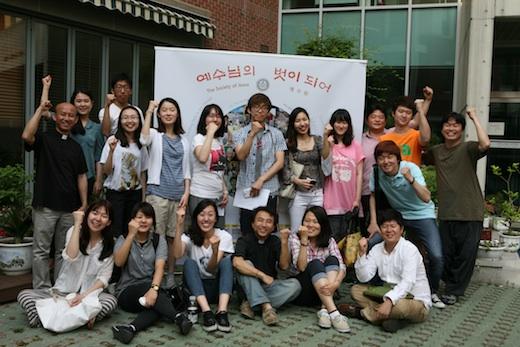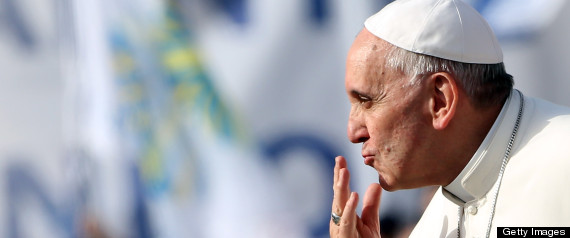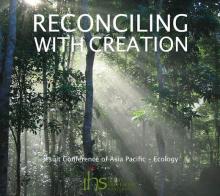Mobile Care Unit now provides dental services
02/05/13 09:00 Filed in: Leprosy

CRSS‘s Mobile Care Unit is piloting a dental service in addition to the eye cataract surgery and eye lid repair services to the People Affected by Leprosy (PAL) in rural villages.
This new dental service helps to restore dental health to PALs by implanting the necessary teeth. The pilot is conducted in southern part of China first and will be extended to the whole of China.
Casa Ricci has been providing eye services to PALs living in China rural villages since 2006, examined over 6,000 cases and served 2,700 operations in 138 villages in 18 provinces.
Tags: Rehabilitation
Catholics Must Grow in Love of God, Neighbor, Pope Says
VATICAN CITY (CNS)-Christians have “far to go” if they seek to be known primarily for their love of God and neighbor, Pope Francis said.

The first law governing the church as the “People of God” is love, he said, which means “recognizing God as the only Lord of life and, at the same time, welcoming others as true brothers and sisters, overcoming divisions, rivalries, misunderstandings and selfishness.”
At his weekly general audience June 12, Pope Francis continued his series of audience talks about the creed, looking at what Catholics believe about the church.
With more than 50,000 people gathered for the audience in St. Peter’s Square on a hot spring day, the pope lamented that brotherly love does not reign in the world, and often not even in Catholics’ communities, neighborhoods, workplaces or even their homes, “because of jealousy and envy.”
“We must ask the Lord to help us understand his law of love,” he said. “How good, how beautiful it would be if we loved one another as real brothers and sisters.”
“Let’s try something today,” Pope Francis said: “We all have those we like and those we don’t like so much. Perhaps many of us are angry with someone. Let’s say to the Lord, ‘I am angry with this person and that one. I pray for him and for her.'”
“Let’s pray for those with whom we are angry. It’s a good step forward in this law of love,” he said. “Let’s do it. Let’s do it today.”
Pope Francis said that when the Second Vatican Council defined the church as “the People of God,” it recognized that the church belongs to God and the Christian community was formed by him.
“It means that God does not belong to any one people,” the pope said, and his invitation is addressed “to all, without distinction, because God’s mercy wants the salvation of all people.”
“Jesus didn’t tell the apostles or us to form an exclusive group, a group of the elite,” but said to go out to the whole world making disciples of all peoples.
“I want to say to those who feel far from God and from the church, to those who are afraid or indifferent, to those who think they cannot change: The Lord calls you, too, to be part of his people and he does so with great respect and love,” the pope said. “He invites you to be part of this people, the people of God.”
Pope Francis told those at his audience that it is the obligation of every Christian to be a sign of hope and love in the world and to share with others the joy of being forgiven and saved by God.
“It’s enough to open a newspaper to know that evil exists, that the devil acts,” he said. “But I want to say loudly that God is stronger.”
“Do you believe this? That God is stronger?” the pope asked the crowd. “Then let us say it together, ‘God is stronger,'” he said, as many joined him in repeating the phrase.
When things are “dark, marked by evil, they can change if we bring the light of the Gospel, especially with our lives,” he said.
The world needs the Gospel and the witness of Christian love, he said. And it’s up to Catholics to make sure that the church is a place “where each person feels welcomed, loved, forgiven and encouraged to live according to the Gospel.”
For that to happen, he said, “the church must have its doors open, so that anyone can come in, and so that we go out and proclaim the Gospel.”
By CINDY WOODEN
President, American Catholic.org
June 12, 2013
Fr. Nicolás on Personal Change

by Jim Manney
Jesuit Superior General Adolfo Nicolás says that Ignatian spirituality offers a path to personal change that can lead to social change. “If people don’t change, it doesn’t matter how much the system changes,” he said. He added that systems and institutions have changed in many respects, but violence and injustice “seem to be on the rise.”
Fr. Nicolás made the comment in an interview about Pope Francis. He said that the new pope is “one hundred percent Jesuit” and that his style “has up until now never been seen.”
St. Aloysius Gonzaga, 1568-1591

Today’s saint was the eldest son of a prominent Italian nobleman who wanted him to follow in his footsteps. He even sent young Aloysius to be a page in the court of King Philip II of Spain. But Aloysius found life in the court—with its sensual temptations, riches, and intrigues—empty. He desired instead to serve the King of heaven and earth and made know to his father his desire to enter the Jesuits. At first his father opposed him but in time relented and in 1585 he joined the Society of Jesus. During his studies in Rome the plague broke out. Aloysius went around the city looking for the sick whom he carried to hospitals where he cared for them both physically and spiritually, preparing them for death. In time he contracted the plague and died on this day at the age of 23. In 1726 he was canonized and shortly thereafter was named the patron saint of youth.
As we continue our prayers that Christians in Europe may rediscover their true identity and participate with greater enthusiasm in the proclamation of the Gospel, let us ask St. Aloysius to intercede with us. We also begin today the “Fortnight for Freedom,” a special two week period of prayer that the U.S. bishops have initiated in response to the threats to religious liberty in our nation. The following is a prayer that St. Aloysius used to say.
Wisdom Story 62

by Paul Brian Campbell,SJ
From a very early age, Tao-hsin had been on a relentless quest to find the Truth. At the age of fourteen he approached the great Seng-tsan, the Third Zen Patriarch, with a resolution belying his tender years.
“Master, I humbly request that you show me the way of liberation.”
“Has anybody ever put you in bondage?” asked the great master with a frown on his face.
“No, Sir.” “If you are not in bondage,” said the master, “why should you ask for liberation?”
At that moment, young Tao-hsin experienced a profound awakening, and later went on to become the Fourth Zen Patriarch.
Preparing for MAGIS

Energised and inspired by its first experience of MAGIS in Madrid in 2011, the Korean Province is deep into preparations for MAGIS-World Youth Day (WYD) 2013 in Brazil. Fr Joseph Songyong Choe SJ shares their preparations with us.
A group of 34 went to the MAGIS in Madrid – three Jesuits, one sister of the Religious of the Sacred Heart of Jesus, and 30 young adults. On their return from Spain, participants reflected on their experience of MAGIS, and we organized three prayer teams as follow-up. The prayer gatherings continued for about a year; and the group still meets occasionally.
For MAGIS-WYD2013 in Brazil, the Korean Province has a delegation of 27 pilgrims (12 men and 15 women) travelling from Korea, who include two Jesuits (Fr Jong-In Park SJ and Scholastic Hoi-Kang Jung SJ) and a priest of Daejeon Diocese who works in youth pastoral activities. Four university students studying abroad, in the United States, South Africa and Mexico, will join us in Salvador. Also in our group is a journalist from The Catholic Times in Korea who will report and introduce MAGIS Brazil to the Korea Catholic Church.
Since we recruited young adults to MAGIS Brazil last December, we have been holding preparation meetings twice a month. Using preparatory material from the organizing office of MAGIS Brazil, we pray and reflect together; and share our reflections on Facebook. We also spend time learning Ignatian spirituality, and we celebrate mass in different languages (Spanish, Portuguese, English and Korean) in rotation. In addition, we invite international exchange students of Sogang University to join us, and from them we are learning basic Portuguese, the country’s culture, and some songs. The Korean MAGIS team has recently begun preparing a short performance for the “Festival of Nations”, to introduce Korean culture and images through traditional dance and songs to the young adults of the world.

Before 2011, the Korean Province had organised somewhat static programmes, such as retreats, for youth and young adults. However, since 2011 we have been trying to have more active programmes. Some of these are Catholic Youth Talk, a programme to encourage greater passion and a freer life among young adults through discussions of issues encountered by those in their 20s and 30s; Rdv (Rendezvous), which seeks to build solidarity with neighbours through community reflection; Religious Life Experience School of the Society of Jesus, which uses the Spiritual Exercises to help in developing the personality and character of youth; and Catholic Academy, academic lectures on a variety of topics to help deepen the quality and depth of the life of youth.In the very early morning of July 12, the Korean MAGIS group will arrive in Salvador where the first Jesuit missionaries arrived to begin their mission in South America. The pilgrims will participate in a three-day festival with other Ignatian youth from around the world, after which they will be divided into four groups (Arts, Social Action, Cultural Immersion, and Ecology) and sent to various regions of Brazil such as the Amazon, northeast Brazil, Rio de Janeiro, São Paulo, and Rio Grande do Sul. The young pilgrims will meet again in Rio de Janeiro to share the richness of their experiences, and also to be united with millions of other youth from around the world for WYD.

Learning Portuguese
Fr Joseph Songyong Choe SJ is responsible for the preparations for the Korean province’s participation in MAGIS 2013.
MAGIS is the most important meeting of Ignatian youth in the world, and is sponsored by the Society of Jesus, in conjunction with World Youth Day. MAGIS 2013 will be held from July 12 to 22 in Salvador, Rio de Janeiro, and about 40 other Brazilian cities. It will be one of the largest delegations of WYD. Organizers expect 2,000 young people, between the ages of 18 and 30, to come from 50 countries, including the United States, Germany, France, Spain, Ethiopia, Mauritius, Jamaica, Kenya, Lebanon, Syria, Latvia and Lithuania, Singapore, Tanzania, the United Kingdom, and Zambia. For more information on MAGIS, visit www.magis2013.com.
Families Flock to Arts-based Faith Formation Program
– An art-based program must be anchored in creativity. The end product is not important, the process is the goal. – An arts-based program must have strong support from the pastor and the faith formation commission. It’s easy for an outsider to assume children aren’t learning but being entertained. – An arts-based multi-aged program relies on the commitment of families. Parents are expected to be involved, making sure children attend classes and do homework, as well as volunteer. – Space is key. Parishes and organizer should try to find a space that accommodates all families, but also allows for small group break-outs. – The prayer experience cannot be ignored. There will be pressures of time, children’s focus, and family schedules, but classes must start and end with a prayer (formal, song, choreography, spontaneous, etc.)

5 tips for creating an arts-based program
By Catherine Brunell
For the first seven years of parenting, my husband and I bounced around between parishes and Mass times, depending on nap schedules and how many kids we had. Mass, if we even got there at all, was something we just tried to get through (especially without spilling our entire stash of Cheerios or raisins.)
When our oldest was ready for a religious education program, however, bouncing-around wouldn’t work anymore. My husband and I both attended Catholic schools, and we wanted our son Turner to have the same experience we did.
There were some good programs in parishes nearby, but most were 45-minute drop-off lessons. I imagined running errands while Turner got a quick shot of religion. It left me uneasy about his faith experience. We wanted something that invited our whole family to participate, something that would stand out in our schedules and was different from our rush-rush mentality.
Around that time, our friends told us about their children’s religious education class. Their arts-based program was multi-aged, had a family retreat component as well as an adult discussion. It would be a bit of a drive, and would disrupt our nap routines, but we were willing to try it.
Eighteen months later, St. Ignatius’s Arts Based Multi-generational Program has added an essential element to a family schedule we thought was full.
The program is based on a series of retreats from the 1970s for high school students, led by a Paraguayan Jesuit who used the arts to deepen participants’ experience of God. At the end of each retreat, an array of paintings, plays, sculptures, and dances would emerge.
Thirty years later, Maria Rodrigues, an almuna of the program, made her way to St. Ignatius Parish in Boston and approached Pastor Bob VerEecke, SJ, about creating a Sunday school program based on her retreat experience.
With the help of a team of parents, Ms. Rodrigues founded the Arts Based Multi-generational Program. And 16 years later, the program is bursting with 85 children from first to sixth grade—with middle school students petitioning to stay in the program through eighth grade.
In every class, art, which includes drama, dance, music, photography, fine arts, and poetry, is the medium children use to experience God and learn about our teachings.
For example, middle school students read Jesus’ Resurrection story and were invited to think about the “boulders” in their own lives. What did they need to roll back to enter the life Jesus wants for them? They each sculpted an image of their boulders, depicting things like shyness, pressure to excel at math, and forgiveness.

Fifth graders collaborate on a dramatic presentation.
The Arts Program helps makes the experience of God and religion joyful and fun. It helps children find God in all things, and uses creative expression to access God’s ongoing Revelation and presence. Instead of children learning a fact about Church history or the story of Jesus, the arts program helps them hear, feel, explore, and express the scene.
We’re pleased our oldest child is in a setting that welcomes the silliness of an eight-year-old boy while still pushing him to make connections between how he plays on the playground and what he hears in the Gospels.
Each week we do the homework as a family and ponder questions like, “What would the Good Samaritan story look like if it happened in your school?” and “Why do we all fail to help our neighbors sometimes?”
We are so grateful to have found a program that has a beautiful mix of theology, joy, community, and ritual.
Catherine Brunell is the author of Becoming Catholic, Again, published by Loyola Press. She has a master’s degree in pastoral ministry from Boston College and lives in Natick, Massachusetts, with her four children and husband.
Lunchtime Examen
by Jim Manney
The Lunchtime Examen invites you to pause at noontime (or whatever time fits your calendar) to review your day in the presence of God. This six-session series is led by Jim Manney, author of The Prayer That Changes Everything: Discovering the Power of St. Ignatius Loyola’s Examen.

Each session in the Lunchtime Examen will focus on a spiritual theme, such as gratitude or forgiveness. New prayer presentations will be available on consecutive Wednesdays, starting March 9, making it a perfect weekly prayer practice for Lent.
Knowing that not everyone prays at the same pace, you have control over the pace of the Lunchtime Examen. On each screen, a Continue button will appear. Click it when you are ready to move on.
Please be patient if it takes a few moments to load the Flash presentations.

March 9 (Ash Wednesday)
Session 1: Why is this a good way to pray?
Session 1 Journal Page (PDF)

March 16
Session 2: Where can I find God?
Session 2 Journal Page (PDF)

March 23
Session 3: What do I pray about?
Session 3 Journal Page (PDF)

March 30
Session 4: What do our feelings have to do with prayer?
Session 4 Journal Page (PDF)

April 6
Session 5: What does the Examen have to do with being honest with God?
Session 5 Journal Page (PDF)

April 13
Session 6: What shall I do?
Session 6 Journal Page (PDF)
Pope Francis speaks about the need for financial reform

On the 16th of May Pope Francis addressed the new new non-resident ambassadors to the Holy See from Kyrgyzstan, Antigua and Barbuda, Luxembourg and Botswana. He spoke about the worldwide financial and economic crisis saying that this crisis highlights “the gravely deficient human perspective, which reduces man to one of his needs alone, namely, consumption. Worse yet, human beings themselves are nowadays considered as consumer goods which can be used and thrown away. We have started a throw-away culture. This tendency is seen on the level of individuals and whole societies; and it is being promoted!” He also said that there is a need for financial reform along ethical lines that would produce in its turn an economic reform to benefit everyone, something that would require a courageous change of attitude on the part of political leaders.
New book for reconciling with creation

by EcoJesuit
A new resource book is available for those interested in learning more about the ecological dimension of the Jesuit mission. Produced by the Jesuit Conference of Asia Pacific and Environmental Science for Social Change (ESSC) in the Philippines, Reconciling with Creation contains documents that will help people reflect on and engage in Reconciliation with Creation.
The documents in the book include Healing a Broken World and a reflection on the recent history of its development; and Our Environmental Way of Proceeding, which outlines JCAP’s overarching approach to ecological engagement. Also included are some of the ways that people are using Our Environmental Way of Proceeding and how they are adapting and applying it to specific contexts and programmes of activity. There is also a section on global advocacy in an Ignatian context.
Hard copies of Reconciling with Creation are available at the office of Environmental Science for Social Change. Copies can also be ordered through Ms Mariel de Jesus ([email protected]).





